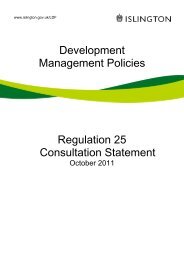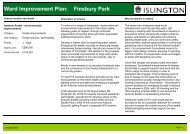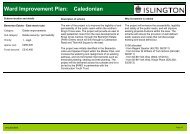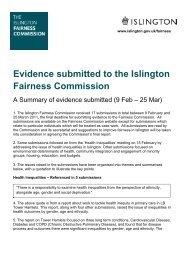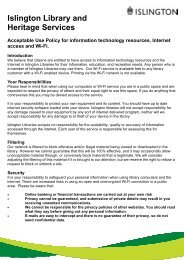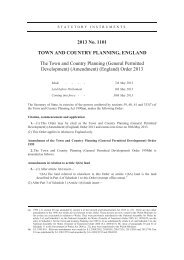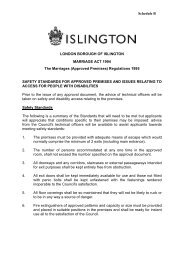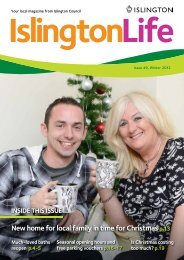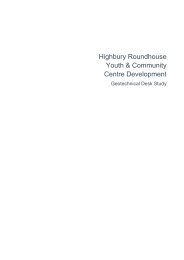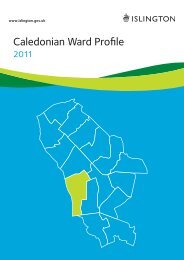Two Islingtons: Understanding the Problem - Islington Council
Two Islingtons: Understanding the Problem - Islington Council
Two Islingtons: Understanding the Problem - Islington Council
Create successful ePaper yourself
Turn your PDF publications into a flip-book with our unique Google optimized e-Paper software.
care, education, health and family support. Bilingual family support workers have targeted<br />
Somali, Bangladeshi and Turkish communities and have made a measurable difference to<br />
widening access to children’s centre services. <strong>Islington</strong>’s admission’s policy ensures that<br />
30% of care and education places in every children’s centre are allocated to vulnerable<br />
children who are in need and who have been referred to <strong>the</strong> centre by social workers and<br />
health professionals.<br />
2.14. The NEET’s engagement programme is on track to deliver most of its targets for<br />
contacting and engaging young people on programmes. However, <strong>the</strong> proportion<br />
achieving accreditation and entering EET is slightly lower than targets would indicate<br />
should be <strong>the</strong> case. Agreement was reached with City and <strong>Islington</strong> College to offer a<br />
guarantee to all those 16 and 17 year olds who may have not yet taken up EET or who<br />
needed to reconsider <strong>the</strong>ir pathway. This ‘January Guarantee’ provides additional access<br />
to courses starting from January 2010. The official NEET’s count (Qtr3 2009/10) was 7.8%<br />
which is <strong>the</strong> same as <strong>the</strong> previous year and above <strong>the</strong> central London average of 6.2%.<br />
2.15. Considerable progress has been made towards positive change in comparison to our<br />
neighbours over <strong>the</strong> last 5 years. The level of NEETs has reduced by nearly 10% from<br />
October 2004 which is faster than <strong>the</strong> London average of 6%. Progress has also been<br />
made towards reducing <strong>the</strong> number of people we don’t have information about. We are<br />
continuing to stabilise this and as at September 2009 this stood at 4.2%. This performance<br />
is as a result of a number of on going actions, for example, targeting of <strong>the</strong> most at risk<br />
groups through data analysis, implementation of processes and procedures for tracking of<br />
young people within certain timescales as part of every personal adviser’s work and <strong>the</strong><br />
Career Start project which provides employment and work experience opportunities for<br />
looked after young people and care leavers.<br />
2.16. We have a good understanding of <strong>the</strong> inequalities that exist in educational attainment as<br />
<strong>the</strong>re is a wealth of data collected and analysed on a regular basis. Addressing inequalities<br />
in achievement is one of <strong>the</strong> main challenges facing <strong>the</strong> <strong>Council</strong> and its partners. Despite<br />
year on year improvements overall in attainment results we continue to under-perform in<br />
comparison to <strong>the</strong> national achievements and inequalities continue to exist between<br />
different equality groups within <strong>the</strong> borough, particularly between different ethnic groups<br />
and <strong>the</strong> genders. We know that 95% of our NEETs are from families on out of work<br />
benefits highlighting <strong>the</strong> issue of intergenerational worklessness and that <strong>the</strong>re is also a<br />
high proportion of White children who are NEETs. The Children and Young Peoples plan<br />
details how <strong>the</strong>se inequalities are to be addressed. The Children’s Services Ofsted self<br />
assessment document (July 2010) provides <strong>the</strong> needs assessment for <strong>the</strong> plan which will<br />
be completed by April 2011.<br />
3. Family Based Interventions & Direct Support<br />
3.1. <strong>Islington</strong> <strong>Council</strong> has launched a new volunteering project in partnership with national<br />
charity Community Service Volunteers (CVS) called Think Family. The project is a<br />
volunteer scheme aimed at supporting vulnerable families in which a parent or carer has<br />
mental health problems and where <strong>the</strong>re are children under <strong>the</strong> age of nineteen.<br />
Volunteers make regular visits to families and offer non-judgmental practical and emotional<br />
support to help <strong>the</strong>m improve <strong>the</strong>ir family life. This could include a range of tasks including<br />
helping socially isolated families access local services, enabling children to take part in<br />
activities, offering support with parenting skills and practical household tasks and being a<br />
role model to children and parents who might not have many in <strong>the</strong>ir lives.<br />
4



